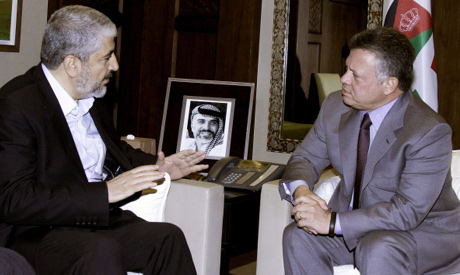PLO's Erekat welcomes Hamas acceptance of two-state solution
Ahram Online , Wednesday 30 Jan 2013
Palestinian reconciliation is advancing, says top PLO official, as Hamas expresses acceptance of the principle of a two-state solution to the Israeli-Palestinian conflict

Hamas's approval of the two-state solution reveals the tendency of the movement to cooperate with the political platform of the Palestine Liberation Organisation (PLO), senior Palestinian negotiator Saeb Erekat told the Saudi Al-Sharq Al-Awsat newspaper Wednesday.
Erekat, a member of the PLO Executive Committee, stated that the decision of the Islamist movement to accept a state based on pre-1967 borders with East Jerusalem as its capital stems from its willingness to pave the way for further inter-Palestinian reconciliation.
"Hamas has to maintain this orientation in case of a future revival of talks with the Israeli side, as the two-state solution signifies the cornerstone of the PLO's position towards the peace process," he noted.
Meanwhile, Erekat welcomed the recent meeting between Hamas leader Khaled Meshal and Jordan's King Abdullah II, calling on the international community to understand that Amman is a "partner" to the Palestinians.
Meshal said Monday that the world "must respect" Palestinian reconciliation talks during a visit to Jordan, a palace statement said.
"I am optimistic about Palestinian reconciliation. The international community must respect the Palestinian need to end division," AFP quoted Meshal as saying after meeting Abdullah in Amman.
"A two-state solution is the only means to achieve security and stability in the Middle East," Meshal added.
Meshal visited Jordan twice last year. Relations between Hamas and Amman have been strained since 1999 when authorities expelled Meshal and three other Hamas members after the group was accused of threatening the kingdom's security and stability.
Hamas had previously expressed firm rejection of the two-state solution and granting recognition to Israel, a situation that led the West, especially the United States, and Israel to exclude the movement from all rounds of peace talks.
However, at their first meeting in almost a year, Meshal and Palestinian President Mahmoud Abbas agreed this month on reviving the stalled 2011 reconciliation deal between the rival Palestinian factions.
The two Palestinian leaders also agreed to allow Hamas a degree of representation in the PLO, which has historically been led by Fatah, indicating the urgency of further rapproachment on remaining disputed issues, including the peace process.
Hamas declared support for Abbass' successful UN bid to grant Palestine non-member observer state status in the world body, approved by the General Assembly 29 November.
Abbas, in return, backed Hamas during the latest Israeli war on the Gaza Strip, including destructive attacks on buildings and media centres across the besieged territory, killing more than 162 Palestinians in a week of non-stop airstrikes.
For his part, Israeli Prime Minister Binyamin Netanyahu’s government recently announced plans to build almost 3,000 settler units in the occupied West Bank, just before the UN vote on Palestinian recognition.
The construction will take place in the highly sensitive "E-1" area of the West Bank, which lies between annexed East Jerusalem and the nearby Maale Adumim settlement. Netanyahu claimed that Jerusalem has been the capital of the Jewish people for "3,000 years."
________________
http://english.ahram.org.eg/News/63654.aspx